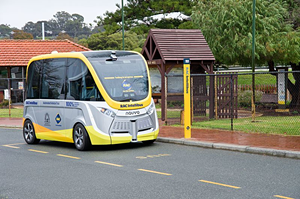
The Tampa Bay region is notorious for its traffic-choked roadways, as anyone who has tried to get literally anywhere in Tampa by car between 4:30 and 7 p.m. knows painfully well.
Many officials and activists believe our famously excruciating rush hour is due, at least in part, to the lack of a formidable bus system, safe pedestrian and bike trails and the dearth of political will to invest in rail or another efficient way of getting people around without making them drive.
It's been a huge political issue on both sides of the bay for years, one that pits planners and environmentalists who want to reduce the area's carbon footprint and urban sprawl against penny-pinching conservatives who don't want their tax dollars to go toward projects that won't benefit them personally.
Hillsborough and Pinellas Counties have both seen measures that would have slightly upped the sales tax (by a penny per dollar) to fund transit (including, possibly, rail) torpedoed by the latter.
For years, it was a largely partisan issue, with a few outliers from the Republican Party — like former County Commissioner Mark Sharpe — supporting expanding transit funding and a few Democrats who argued that funding rail and bus expansion via county sales tax (the only way to legally fund it in Florida right now) would disproportionately impact the poor.
Yet on Thursday, it was two Republican state lawmakers who expressed a desire to do something about all the gridlock — albeit in a manner that appears to differ some from the desired path of environmentalists and land use planners.
State Sen. Dana Young (R-Tampa) and State Rep. James Grant (R-Tampa) announced companion proposals in their respective chambers that would, if passed (and it could be a very big if), would create an entity called the Statewide Alternative Transportation Authority, which, with matching dollars from private companies, would fund transportation innovation through the Tampa Bay Area Regional Transportation Authority (TBARTA, a regional agency that has been somewhat dormant in recent years) and a similar agency in Miami and other parts of the state as needed. The proposal takes $60 million from Orlando's SunRail system over several years, but Young said it would do so in a manner that wouldn't harm that agency. The aim is to shift the focus from "traditional" modes to newer solutions.
“Tampa Bay is already a national leader in transportation innovation, including development and testing of autonomous vehicle technology,” Young said in a written statement following a press conference in Tampa. “By repurposing an existing and unused transportation authority to support new and innovative approaches to transportation, we are poised to take Tampa Bay to a whole new level. This $25 million appropriation to TBARTA is an exciting first step toward our innovative transportation future.”
It would also do something similar in South Florida, a similarly traffic-intensive region.
Those who have long been trying to shift public opinion on modes like light rail might not want to get all that excited yet, though.
After all, in his remarks, Grant said that, like the seemingly endless road-widening we see, fixed rail systems can be cumbersome. The focus would apparently instead be on alternative transit modes that largely rely on cars (though hyperloop trains and "rail buses" may also be part of the picture, the Tampa Bay Times' William March notes).
“We cannot solve Tampa Bay’s transportation and traffic issues with more of the status quo," Grant said in a statement. "The answer to moving people more efficiently through our community cannot always be to build more roads or lay inflexible and expensive fixed rail lines. We have to embrace the innovation that’s happening in the transportation world if we want to make meaningful change and that means rideshare, car share, autonomous vehicles, and everything in between. This bill aims to make that kind of agile innovation a reality in our community.”
Tampa Mayor Bob Buckhorn told March that the proposal is a start, but that the state shouldn't be shifting its focus at the expense of something like rail, which many see as an appropriate transportation mode for Tampa and St. Pete.

